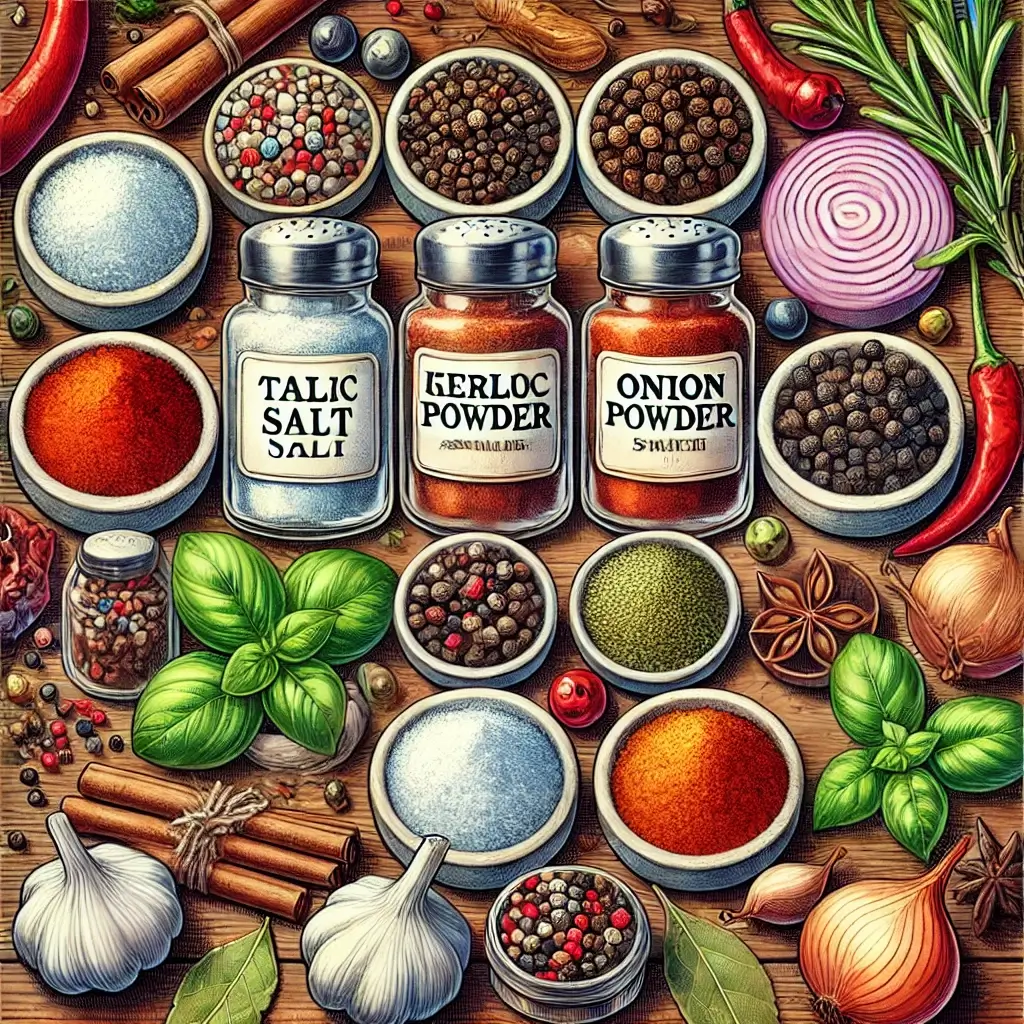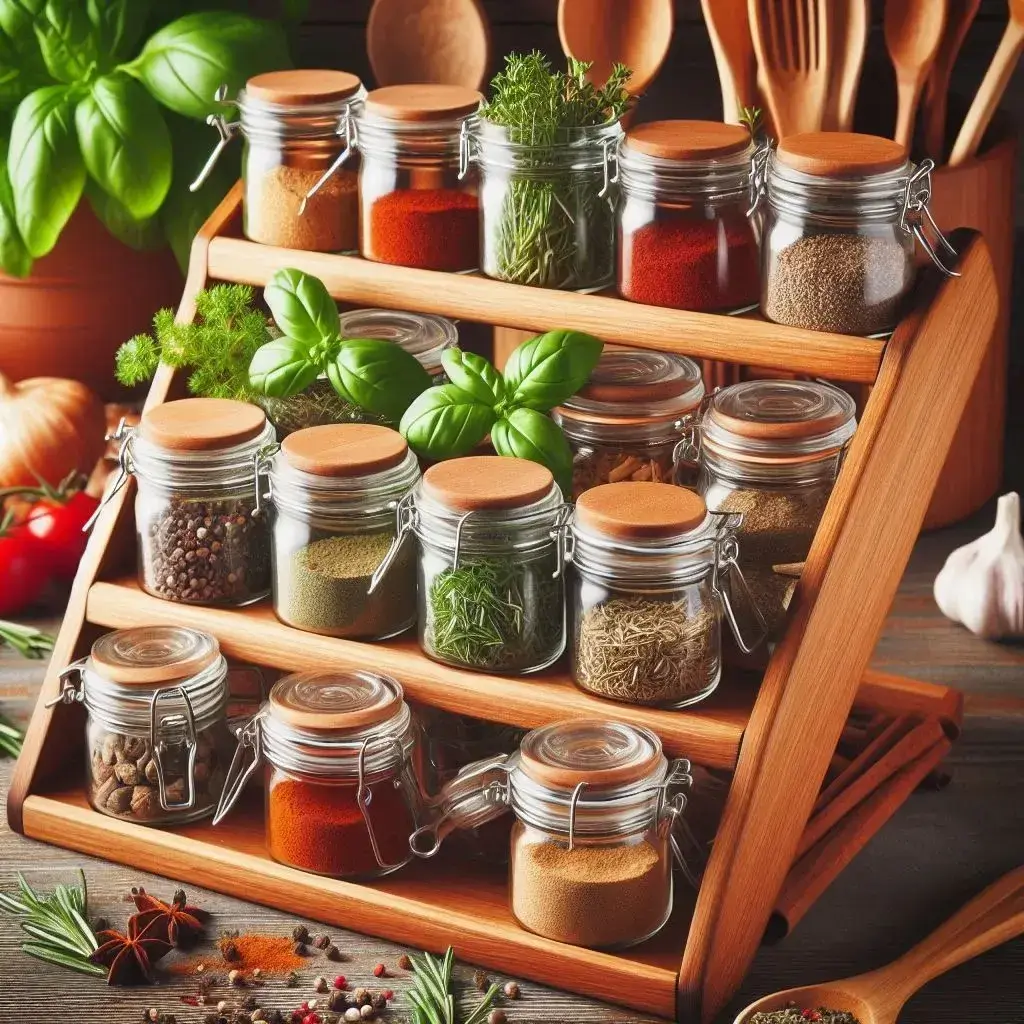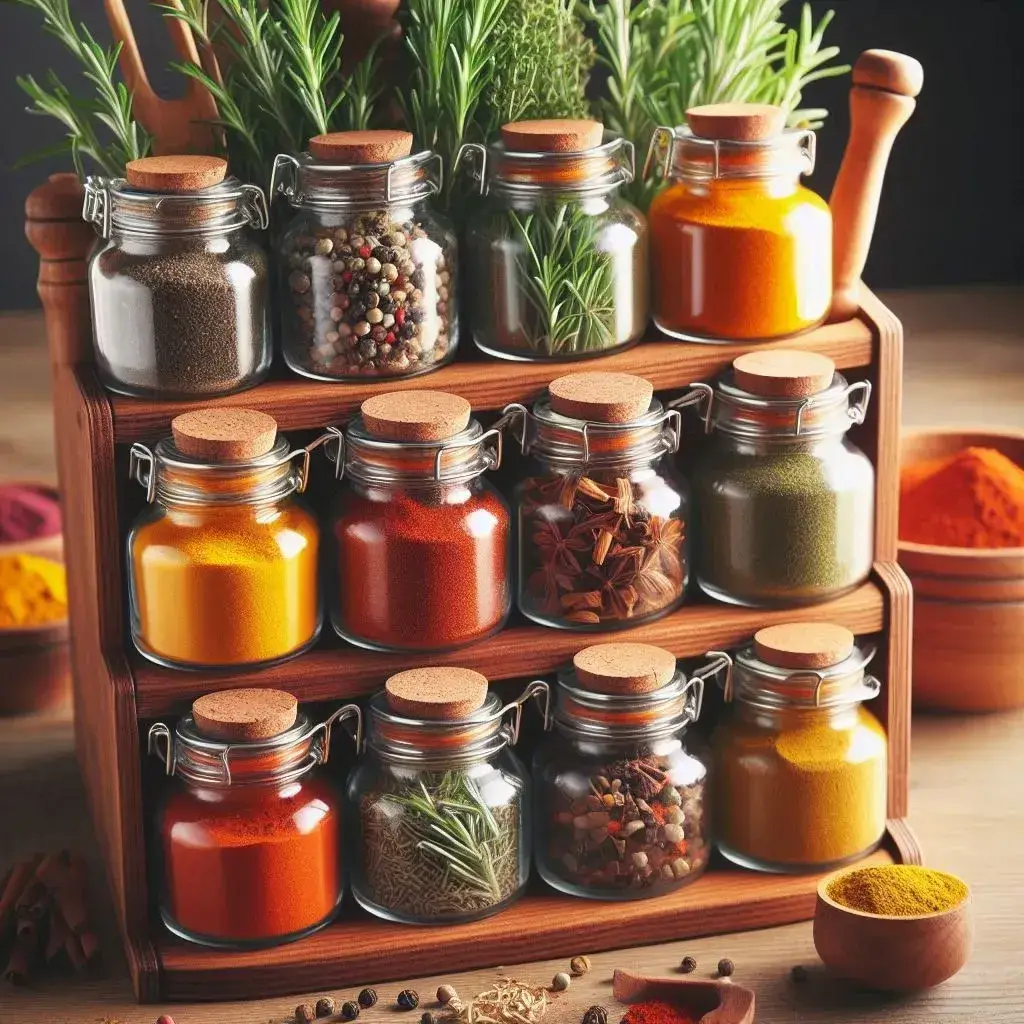- Camping Essentials Ultimate Guide 2025(Keep up to date) - 08/20/2025
- Can Dogs Eat? Ultimate Guide 2025 (Keep up to date) - 08/18/2025
- Places to Eat Near Me: Ultimate Guide (2025 Edition) - 08/18/2025

Table of Contents
Seasonings are the unsung heroes of the culinary world, capable of transforming a simple dish into a gourmet masterpiece. Whether you’re a seasoned chef or a home cook, understanding how to use the right seasonings can elevate your cooking to new heights. In this article, we’ll explore some of the best seasonings that every kitchen should have, along with tips on how to use them effectively.
1. Salt: The Essential Seasoning
Salt is arguably the most important seasoning in any kitchen. It enhances the natural flavors of food, balances sweetness, and can even suppress bitterness. There are various types of salt, including table salt, kosher salt, sea salt, and Himalayan pink salt, each with its own unique properties.
- Table Salt: Fine-grained and usually iodized, it dissolves quickly and is best for baking.
- Kosher Salt: Coarser than table salt, it’s easier to control the amount used, making it ideal for seasoning meats.
- Sea Salt: Mined from evaporated seawater, it contains trace minerals that add complexity to dishes.
- Himalayan Pink Salt: Known for its distinctive pink color and mineral content, it’s perfect for finishing dishes.
2. Pepper: The King of Spices
Black pepper is a versatile spice that adds heat and depth to a wide range of dishes. Ground black pepper is common, but freshly cracked peppercorns deliver a more potent flavor.
- Black Pepper: The most common variety, it’s perfect for everything from soups to steaks.
- White Pepper: Milder and less pungent, it’s often used in light-colored dishes to avoid black specks.
- Green Pepper: Unripe peppercorns that offer a fresher, more herbal flavor, great for salads and sauces.
3. Garlic Powder: A Flavor Powerhouse
Garlic powder is a convenient alternative to fresh garlic, offering a concentrated flavor that blends easily into dishes. It’s perfect for seasoning meats, vegetables, and even popcorn.
- Usage Tips: A little goes a long way, so start with a small amount and adjust to taste. It’s particularly useful in dry rubs and marinades.
4. Onion Powder: Subtle Sweetness
Onion powder provides a mild, sweet onion flavor without the texture of fresh onions. It’s a key ingredient in spice blends like chili powder and can be used in soups, stews, and dressings.
- Usage Tips: Like garlic powder, it’s potent, so use sparingly. It’s great for adding depth to sauces and gravies.
5. Paprika: Sweet, Smoky, and Spicy
Paprika is made from ground red peppers and comes in three main varieties: sweet, smoked, and hot.
- Sweet Paprika: Mild and sweet, it’s ideal for adding color and a subtle flavor to dishes.
- Smoked Paprika: Adds a deep, smoky flavor that’s perfect for grilled meats and stews.
- Hot Paprika: Offers a spicy kick, commonly used in Hungarian and Spanish cuisine.
6. Cumin: Earthy and Warm
Cumin is a staple in many global cuisines, from Indian curries to Mexican chili. Its warm, earthy flavor pairs well with meats, beans, and vegetables.
- Usage Tips: Toasting cumin seeds before grinding enhances their flavor. Ground cumin is more convenient but less potent than whole seeds.
7. Cinnamon: Sweet and Savory Versatility
Cinnamon is often associated with sweet dishes, but it also works well in savory recipes. It adds warmth and depth to curries, stews, and even roasted meats.
- Usage Tips: Ground cinnamon is more versatile, but cinnamon sticks are great for infusing liquids like mulled wine or spiced tea.
8. Bay Leaves: Subtle Complexity
Bay leaves are used to add a subtle, herbal flavor to soups, stews, and braises. While they’re not meant to be eaten, they impart a complexity that’s hard to replicate with other herbs.
- Usage Tips: Add whole bay leaves to dishes that cook for a long time, then remove them before serving.
9. Oregano: The Mediterranean Staple
Oregano is a robust herb that’s essential in Mediterranean cuisine. It pairs well with tomatoes, making it a key ingredient in pasta sauces and pizza.
- Usage Tips: Dried oregano is more potent than fresh, so use it sparingly. It’s also great in marinades and rubs for grilled meats.
10. Basil: Fresh and Fragrant
Basil is known for its sweet, aromatic flavor, which is a hallmark of Italian cuisine. Fresh basil is ideal for pesto, salads, and garnishing dishes, while dried basil works well in cooked recipes.
- Usage Tips: Add fresh basil at the end of cooking to preserve its flavor. Dried basil is best used in slow-cooked dishes where it has time to rehydrate.
11. Rosemary: Piney and Bold
Rosemary has a strong, piney flavor that’s perfect for hearty dishes like roasted meats and potatoes. It’s also a great addition to bread dough and marinades.
- Usage Tips: Fresh rosemary is more aromatic than dried. Use whole sprigs for infusing oils and vinegars or chop the leaves for direct seasoning.
12. Thyme: Earthy and Savory
Thyme is a versatile herb that complements a wide range of dishes, from roasted vegetables to chicken and seafood. Its earthy, slightly minty flavor pairs well with other herbs like rosemary and sage.
- Usage Tips: Fresh thyme is more delicate and should be added towards the end of cooking, while dried thyme can withstand longer cooking times.

Conclusion
Seasonings are the key to unlocking the full potential of your cooking. By understanding the unique properties and best uses of each, you can enhance the flavor of any dish. Whether you’re sprinkling a pinch of salt, grinding fresh pepper, or infusing a stew with bay leaves, these seasonings will help you create delicious, memorable meals. Experimenting with different combinations can also lead to exciting new flavors, making cooking an endless adventure of taste.
Amazon Best Sellers in Home & Kitchen: Top 10 Must-Have Products for Your Home 2025
Need to spruce up your home without the hassle? Amazon's got the goods - from game-changing kitchen gadgets to cozy bedding that'll make you never want to leave your house. The best part? These picks aren't just popular, they're actually worth your hard-earned cash (with thousands of happy customers backing them up).
We're breaking down:
🏆 The 10 home & kitchen essentials everyone's buying
⭐ Real-deal reviews from people who actually use this stuff
🔗 Easy links so you can grab 'em quick
No fluff - just the home upgrades that deliver. Let's check out what's worth adding to your cart!
1. Owala FreeSip Insulated Stainless Steel Water Bottle
🚀 Why it’s a Best Seller: A leak-proof, insulated bottle with a unique FreeSip design—perfect for on-the-go hydration!
Key Features:
- 24 oz capacity – Great for sports, travel, and daily hydration.
- Innovative FreeSip spout – Allows for sipping upright through the built-in straw or tilting back for chugging.
- Double-wall insulation – Keeps drinks cold for up to 24 hours.
- BPA-free and dishwasher safe – Safe and easy to clean.
Why Customers Love It:
✅ Durable & stylish – The Denim color is sleek, and the stainless steel construction is built to last.
✅ Great for travel – Leak-proof lid prevents spills in bags.
✅ Comfortable to hold – The ergonomic design makes it easy to carry.
⭐ Rated 4.8/5 on Amazon with thousands of reviews!
2. Stanley Quencher H2.0 Tumbler with Handle & Straw
🔥 Why it’s a Best Seller: The viral Stanley tumbler is a hydration game-changer with a 30 oz capacity and ergonomic handle!
Key Features:
- FlowState 3-position lid – Prevents spills and allows easy drinking.
- Double-wall vacuum insulation – Keeps drinks cold for up to 11 hours and ice cold for 2 days.
- Comfort grip handle – Perfect for carrying around.
- Fits in car cup holders – Designed for easy travel.
Why Customers Love It:
✅ Trendy and practical – Available in multiple colors, including the beautiful Peony shade.
✅ Large capacity – Holds enough water for a full day.
✅ Keeps drinks cold for hours – Ideal for hot summer days!
⭐ Over 50,000 reviews and a 4.9/5 rating!
3. TERRO T300B Indoor Liquid Ant Killer
🐜 Why it’s a Best Seller: Say goodbye to ant infestations with this highly effective liquid ant bait.
Key Features:
- Pre-filled bait stations – Easy to use and mess-free.
- Targets the entire colony – Not just the ants you see.
- Works within days – Quickly eliminates ant infestations.
Why Customers Love It:
✅ Highly effective – Works on various ant species.
✅ Safe for indoor use – No strong chemical smells.
✅ Affordable & long-lasting – Comes with 12 bait stations!
⭐ 4.7/5 stars with 70,000+ reviews!
4. Queen Size 4-Piece Sheet Set - Hotel Luxury Bedding
🛏️ Why it’s a Best Seller: Ultra-soft, breathable, and wrinkle-free hotel-quality bed sheets!
Key Features:
- Deep pockets – Stays securely on mattresses.
- Soft & breathable – Made from high-quality microfiber.
- Wrinkle-free & easy care – Machine washable.
- Oeko-Tex Certified – Safe and eco-friendly materials.
Why Customers Love It:
✅ Super soft & luxurious – Feels like a 5-star hotel.
✅ Perfect fit – Stays in place on all mattress sizes.
✅ Easy to maintain – No ironing needed!
⭐ 4.6/5 stars and a customer favorite!
5. upsimples 8x10 Picture Frame
🖼️ Why it’s a Best Seller: A sleek, modern photo frame that enhances any home decor.
Key Features:
- Two display options – 5x7 with mat or 8x10 without mat.
- Wall-mounted & tabletop display – Versatile design.
- Durable & stylish – Black frame suits any decor.
Why Customers Love It:
✅ Lightweight & easy to hang
✅ Protects photos with HD plastic cover
✅ Affordable & stylish home decor
⭐ 4.5/5 rating from thousands of happy buyers!
6. Zevo Flying Insect Trap & Cartridge
🦟 Why it’s a Best Seller: A plug-in, mess-free indoor bug trap that uses blue & UV light to attract and eliminate flying insects.
Key Features:
- Attracts & traps gnats, house flies, and fruit flies – No chemicals or sprays needed.
- Uses blue & UV light technology – Scientifically designed to lure insects.
- Mess-free & odor-free – No dead bug clean-up.
- Compact and stylish – Fits seamlessly in any room.
Why Customers Love It:
✅ Works effectively indoors – Perfect for kitchens, bedrooms, and living areas.
✅ No harmful chemicals – Safe for homes with kids and pets.
✅ Replaceable cartridges – Easy to maintain for long-term use.
⭐ Rated 4.6/5 with thousands of positive reviews!
7. Utopia Bedding Queen Bed Sheets Set
🛏️ Why it’s a Best Seller: Soft, shrink-resistant, and easy-care microfiber sheets that feel as luxurious as high-end hotel bedding.
Key Features:
- Includes 4 pieces – 1 flat sheet, 1 fitted sheet, and 2 pillowcases.
- Brushed microfiber fabric – Ultra-soft and breathable.
- Fade & shrink resistant – Maintains its quality after multiple washes.
- Deep pockets & secure fit – Fits mattresses up to 16 inches thick.
Why Customers Love It:
✅ Super soft and comfortable – Perfect for all seasons.
✅ Easy to wash & maintain – Machine washable and wrinkle-free.
✅ Affordable luxury – Feels expensive without the high price tag.
⭐ 4.6/5 rating from over 100,000 buyers!
8. Barossa Design Plastic Shower Liner
🚿 Why it’s a Best Seller: A premium waterproof shower liner that keeps your bathroom dry and stylish.
Key Features:
- Made from PEVA material – Non-toxic and environmentally friendly.
- Waterproof & mildew-resistant – Prevents mold and soap scum buildup.
- Rustproof grommets & 3 magnets – Provides extra stability and durability.
- Fits standard-size showers – Lightweight and easy to install.
Why Customers Love It:
✅ Clear, minimalist design – Blends well with any bathroom decor.
✅ Durable & long-lasting – Resistant to wear and tear.
✅ Easy to clean – Simply wipe or rinse to maintain freshness.
⭐ 4.7/5 stars and a top-rated shower liner!
9. Utopia Bedding Throw Pillow Inserts (Pack of 2)
🛋️ Why it’s a Best Seller: Fluffy, soft, and supportive throw pillows that enhance the comfort and look of your couch, bed, or chairs.
Key Features:
- Comes in a set of two – Perfect for pairing on sofas or beds.
- 18 x 18 inches size – Ideal for standard throw pillow covers.
- High-quality polyester filling – Provides plush support.
- Durable and breathable – Keeps shape over time.
Why Customers Love It:
✅ Soft and supportive – Adds a cozy feel to any space.
✅ Perfect for decorating – Works well with various pillow covers.
✅ Easy to maintain – Machine washable for convenience.
⭐ 4.5/5 rating from thousands of happy customers!
10. Utopia Bedding Waterproof Mattress Protector
🛌 Why it’s a Best Seller: A breathable, waterproof mattress cover that protects against spills, allergens, and dust mites.
Key Features:
- 100% waterproof protection – Shields against spills, sweat, and stains.
- Soft terry cloth top layer – Feels comfortable and breathable.
- Fitted design with stretchable pockets – Stays securely in place.
- Hypoallergenic material – Great for allergy sufferers.
Why Customers Love It:
✅ Protects your mattress investment – Extends mattress lifespan.
✅ Doesn’t change mattress feel – Comfortable and silent.
✅ Easy to clean – Machine washable for hassle-free maintenance.
⭐ Rated 4.7/5 by satisfied customers!
Final Thoughts: Upgrade Your Home Today!
These home essentials are bestsellers for good reason - they actually work, look great, and make life easier. Whether you're after:
• The perfect water bottle
• Stylish decor that doesn't break the bank
• Bedding you'll want to live in
• Pest solutions that really work
...thousands of shoppers swear by these picks.
👉 Tap those links to give your home an instant upgrade!
So what's going in your cart first? Drop us a comment below - we want to know!
✅ Pro Tip: Want the hottest Amazon finds? Save this page and come back for fresh picks!
🔥 Smart shopping = Better living 🔥
🎯 Don’t Miss Out — These Are Reader-Favorite Bestsellers You’ll Love Too 👇
| # | 🎁 Product | 💬 Why It Converts | 🔗 Quick Action |
|---|---|---|---|
| ✅ 1 | Exploding KittensThe Wildly Popular Card Game | 🔥 100,000+ rave reviews🤣 Fun for all ages🎉 #1 party game choice | 👉 Click to Check Price |
| 😂 2 | Funny Dad T-Shirt“You Can’t Scare Me, I Have Kids” | 👕 Viral dad gift🎂 Perfect for birthdays & Father’s Day💬 Gets people laughing instantly | 👉 See It in Action |
| 🕯️ 3 | Luxury Candle Gift SetElegant 1-Wick, Spa Fragrance | 🧘♀️ Instant relaxation🎁 Beautifully boxed for gifting💡 Affordable luxury | 👉 Treat Yourself or Gift Now |
| 🔍 4 | Tile Bluetooth TrackerFind Anything in Seconds | 🛠️ Life-saving tech🧓 Great for parents, teens, travelers📱 Works with your phone | 👉 Never Lose Anything Again |
| 📘 5 | Atomic Habits by James ClearTransform Your Daily Life | 📖 20M+ readers worldwide🔑 Simple steps, big results🎓 Top self-growth book | 👉 Read What Everyone’s Talking About |
✅ Why These Items Sell:
| 💡 Trigger | Example in Table | How It Helps Conversion |
|---|---|---|
| ✅ Social Proof | “100,000+ rave reviews” | Builds trust instantly |
| 🎯 Use Case Clarity | “Great for family game night” | Reduces decision friction |
| 🚀 Action Verbs | “Click to check price” | Encourages immediate action |
| 🔥 Urgency & Emotion | “Don’t miss out” / “Treat yourself” | Triggers impulse buying |
| 🎁 Gifting Potential | “Perfect for birthdays & holidays” | Taps into universal purchase intent |
❤️ Your Click Makes a Difference
Every purchase made through these links helps support this site and keeps great content coming — Thanks!
💬 Why Tip? It’s Not Just Money — It’s Motivation ❤️
| 😊 What You Got | 🎁 What I Get | 🔗 What You Can Do |
|---|---|---|
| ✔️ A smile or laugh | ✔️ A reason to keep creating | 👉 Buy me a coffee ☕️ |
| ✔️ Useful tips, insights, or ideas | ✔️ Proof that this content helps | 👉 Click the support button 💸 |
| ✔️ Fun, relatable content | ✔️ Motivation to go deeper & better | 👉 Leave a tip + kind feedback 🙌 |
| ✔️ Ad-free reading experience | ✔️ A little financial breathing room | 👉 $1 isn’t too little, $10 isn’t too much 🎉 |
| ✔️ A sense of connection | ✔️ The joy of being seen and supported | 👉 Let me know you’re out there 👀 |
❤️ If you made it this far, maybe that’s your sign to support? Every tip matters!

